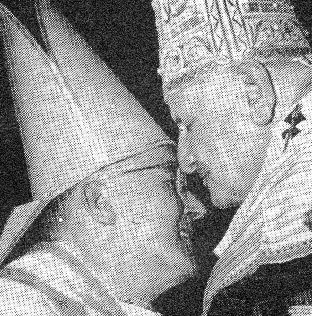Attending the Abbey Grammar in the ’60s we could look out a window to the home at 71 Castle Street, of Archbishop Francis Carroll. The Christian Brothers never tired of lauding his praises as the greatest of their past-pupils. Perhaps we were too young or sceptical then to appreciate their words. To show they were not – in the words of my old mentor, Paddy Arthur Crinion – ‘wasting their sweetness on the desert air’, I post this tribute!
Francis Carroll was born the son of Patrick and Mary Carroll and attended the Abbey Christian Brothers School in Newry. Deciding to become a priest he studied theology at Dromantine until June 1937. He was one of eighteen priests ordained by Bishop Mulhern in St Colman’s Cathedral in December 1936. Frank was to have a distinguished missionary career in Africa. Attempts to establish a mission in the Monrovia district of Liberia had met with limited success before his arrival. Liberia was (and is) an impoverished country with a dispersed population, simmering political unrest, poor communications and a virtual absence of medical facilities. The difficult climate – just a few degrees from the equator, and known as the Whiteman’s Grave – the isolation and the poverty exacted a heavy toll on members of the Irish province of the SMA.
Frank took charge of a mission composed of young and inexperienced priests. His jurisdiction on the Kru Coast was accessible only by sea and was the least developed region of that underdeveloped republic. Yet through his energetic and outgoing personality, his excellent relations with the indigenous population and with the Americo-Liberian government of President Tubman, his clear conception of what he required, his skill in obtaining funds and his exceptional ability to ‘get things done’, he succeeded in transforming the moribund coastal mission of 1951 into the thriving, vigorous mission of 1958.
Frank’s achievements when he became Bishop were no less impressive. His skills as a diplomat when he later served as apostolic delegate and Vatican representative were of inestimable value. For his lifetime’s work Frank was four times decorated by the Liberian government for outstanding services to the nation in education, health, social welfare and evangelism. It is a tragedy that the ‘country of the freed slaves’ today does not have the services of one of his qualities. Liberia unfortunately is once again one of the most afflicted countries on the African continent.
Frank Carroll’s remains lie in St Mary’s Cemetery. An obituary by a senior colleague summarized his life’s work:
‘A missionary in Liberia for forty-two years .. when Archbishop Carroll retired he was beyond question the foreigner who knew more Liberians from all walks of life and all social classes than anyone else. All this time he promoted Liberian education at every level. He took particular interest in the poor and the sick, establishing orphanages and clinics throughout the country. His door was always open not just to diplomats and government officials, but to the poor. He gave particular attention to youth. In a country where Catholics are a small minority he made the role of the Church appreciated by all. He leaves behind the memory of a man of deep faith who had a great love for the people of Liberia.’ And for the people of Newry, I might add. May he rest in peace.
